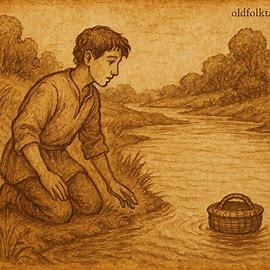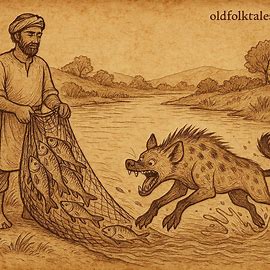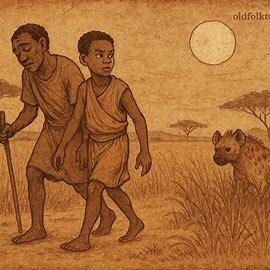Long ago, among the Kimbundu people of Angola, there lived a young man whose life began in bondage. When he was still a child, his uncle had pledged him as security for an ox. What seemed like a small transaction would determine the path of his entire youth. Misfortune deepened when both his uncle and father died, leaving no one alive to redeem him. With no relatives left to rescue him, the boy remained in servitude, growing into a young man under the harsh rule of his masters.
Day after day, he hoed the fields, fetched water, and carried wood. His masters clothed him in rags and beat him when they pleased. Hungry, humiliated, and weary, he often wandered alone into the bush, weeping and whispering to himself: “I am drowning in misery because no kin remains to redeem me.”
The Dream of the River
One night, while sleeping in his master’s house, he dreamed. In the dream, the River itself spoke to him:
“Tomorrow at dawn, before the people rise, go to the landing. There you will find three things. Choose one. The finest will be the ngonga-basket; the other two are of less worth.”
When he awoke, he puzzled over the dream but said nothing. For three days he carried the vision silently. On the fourth night, the River returned, this time stern:
“I told you to go to the landing. Why did you disobey? Tomorrow at dawn, go!”
He woke as the first light of morning touched the sky. Quietly, before others stirred, he set off for the riverbank.
There, wonders appeared. First came a bundle of guns floating on the water, muzzles down, butt-ends up. Next drifted two bales of cotton cloth, gleaming as they passed. Finally, a small woven basket glided gently toward him and stopped at his feet. Remembering the River’s words, he lifted the basket and carried it home.
In secrecy, he tapped it with a twig and hid it in the grass wall of his hut.
The Secret of the Basket
The next morning, curiosity overcame him. He opened the basket, and inside lay an array of medicines, herbs, and charms, all complete. That night, as he slept, the River sent visions again. Spirits revealed to him the secrets of each plant: which healed sores, which cured fevers, and which restored chiefs to health.
READ THIS: Kingungu a Njila and Ngundu a Ndala: An Angolan Folktale That Teaches Lessons on Truth and Justice
From then on, his life changed.
Not long after, two strangers came to his village seeking a doctor. His master dismissed them, saying there were no healers. But the young man stepped forward: “What illness troubles your kin?” he asked. When they hesitated, he told them, “Give me a calling fee, and I will see.”
They agreed, handing him payment. His master mocked him: “You know nothing, not even the herb for a threadworm! If you fail, they will beat you.”
Undeterred, the young man went with the strangers. At the sick man’s house, he examined the patient and declared, “I can heal him.” Each day he treated the man. When unsure, dreams guided him with precise remedies. After twenty days, the patient was well. The family rewarded him with a heifer, the first wealth he had ever owned.
From Slave to Healer
Soon, more people sought him. Each cure brought him cattle. In three years, he had six head. With his growing herd, he told his master: “I will redeem myself. Name your price.”
The master demanded three more cows. The young man paid gladly, at last freeing himself from bondage. He left, built a home in another village, married, and continued practicing medicine. Within six years, his herd had multiplied many times. He became a wealthy and celebrated man, honored far and wide as a true healer.
The Proverb of the River
Thus it was said among the Kimbundu: “Wealth came from medicine.” His story gave rise to a proverb:
Hoe on, even to the tree;
Speak on, even to the end;
A youth must stretch as high as he can reach.
For perseverance, faith in dreams, and courage to seize opportunity can turn bondage into freedom and despair into greatness.
Moral Lesson
This tale teaches that hardship does not define destiny. The young man, though abandoned and enslaved, found hope through perseverance and obedience to the wisdom of dreams. His faith in the River’s guidance gave him not only healing power but the means to redeem his freedom and transform his life.
The story reminds us that even in despair, resilience can uncover hidden gifts. Struggles may feel endless, but if we remain steadfast, opportunity will arrive, like a basket drifting to the shore.
Knowledge Check
Why was the young man given into bondage?
He was pledged by his uncle as security for an ox.
Why could no one redeem him after years in slavery?
His uncle, father, and other relatives had all died.
What vision did the River give him in a dream?
To go at dawn to the landing and choose one of three gifts.
What treasure did the young man select?
A small basket filled with medicines.
How did he learn to heal the sick?
The River revealed remedies to him in dreams.
What lesson does this folktale teach?
Perseverance and faith can turn suffering into freedom and success.
Source: Kimbundu folktale, Angola.






